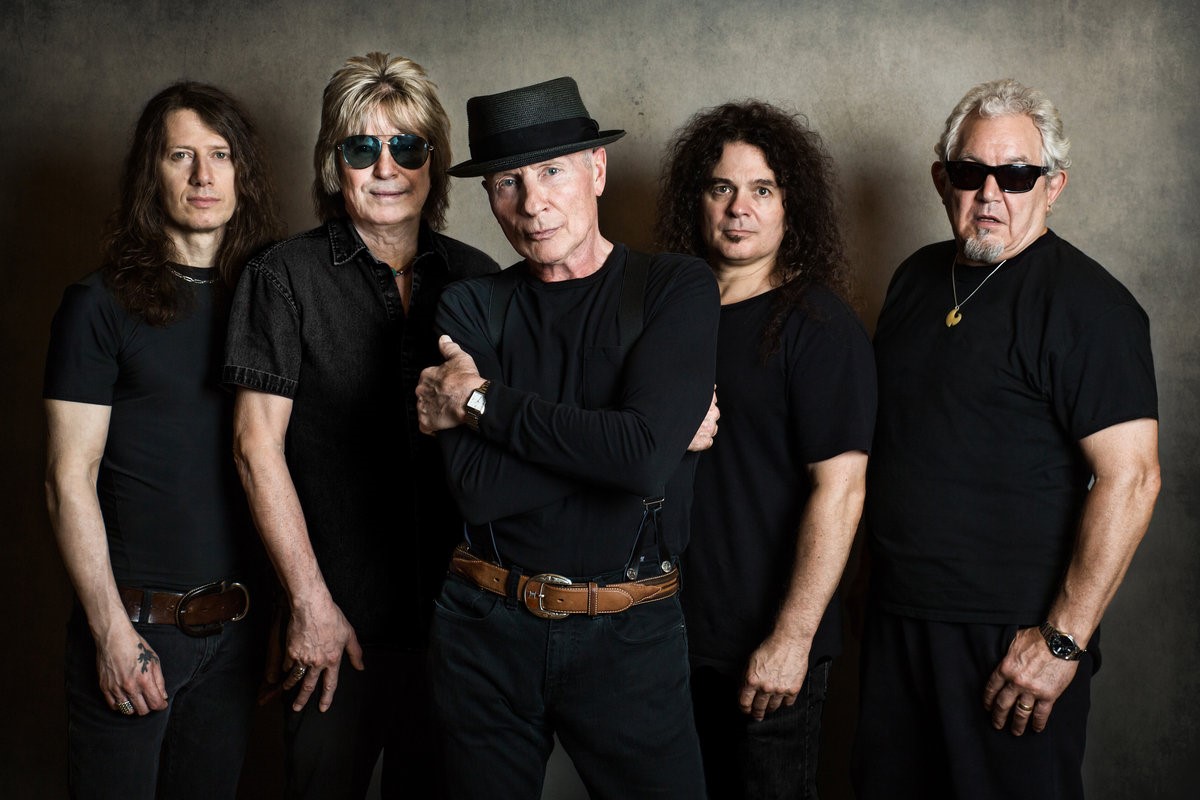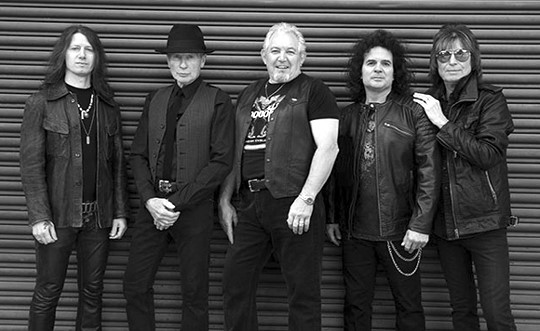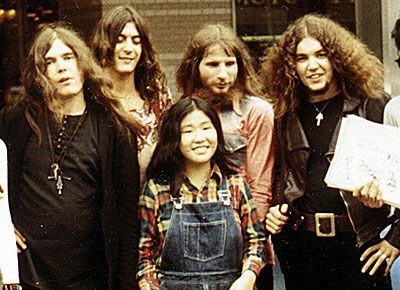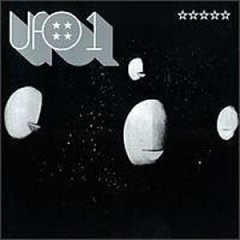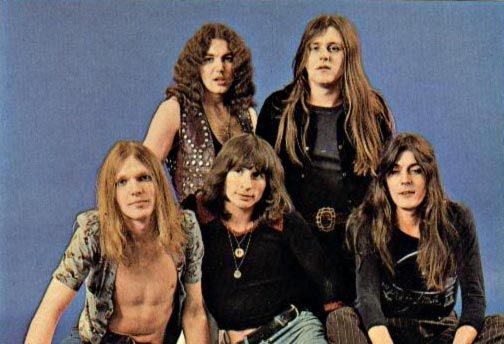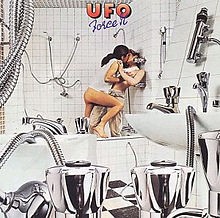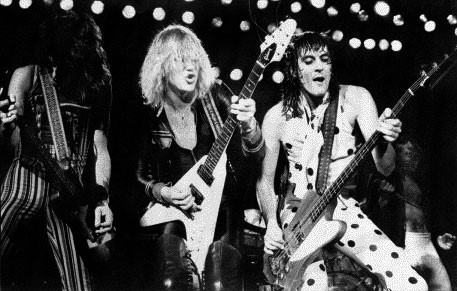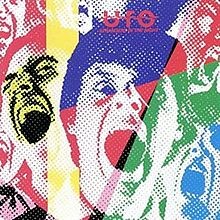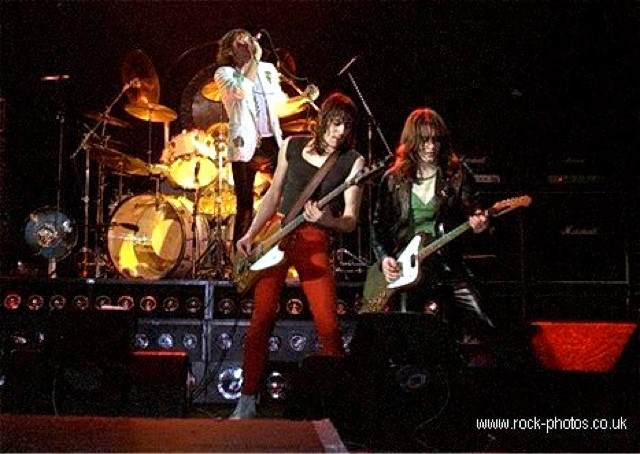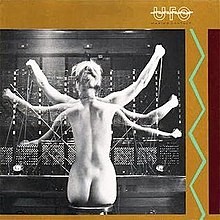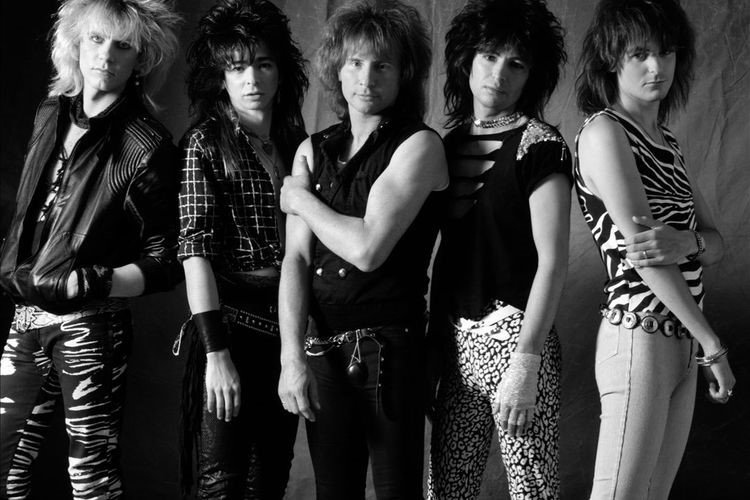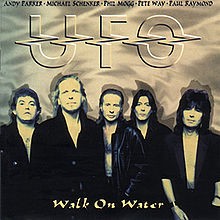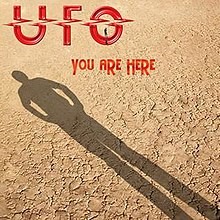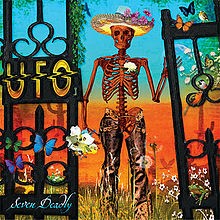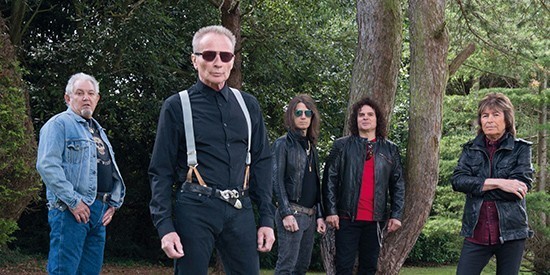Lights Out – Celebrating 50 Years of UFO
By Adam McCann
To last 10 years in this business requires some serious guile, but to survive for 50 years? That takes some serious staying power and UFO have shown time and time again that they are not going to lie down and die. They are a band that rocked as hard as their peers taking rock n’ roll to a new excessive level; drugs, alcohol, drugs, sex, numerous line-up changes and some more drugs often transferred the limelight onto these themes rather than the music.
UFO may not get the plaudits that their contemporaries such as Led Zeppelin, Deep Purple and Uriah Heep get, but during their career, UFO helped to define a genre with some of the best and most memorable 70’s and 80’s songs and alongside a young hot-shot guitarist and a blistering live album, UFO took their place in the annals of heavy metal history. On the 28th May 2018, UFO issued a statement on behalf of the legendary frontman Phil Mogg that after concluding next year’s 50th anniversary, he will be stepping down as vocalist of UFO with the remainder of the band expecting to disband following this
From a personal standpoint, my first memories of UFO involve an over-loved cassette compilation featuring the perennial ‘Doctor, Doctor’. But, that introduction, the arpeggiated picking leading into that galloping riff and sing-a-long lyrics remind us where Iron Maiden would find inspiration. Is it any wonder why? UFO have that lovable and instantly recognisable quality and from ‘Doctor, Doctor’, it is a short stepping stone to ‘Only You Can Rock Me’, ‘Love to Love’ and the furious ‘Rock Bottom’. Like most people, I expanded my UFO knowledge by first purchasing a ‘Best Of’ (in the heady days before YouTube!) and began collecting their albums from there with whatever was the flavour of the week song in the portable CD Player. I will admit that ‘Strangers in the Night’ is still in a heavy rotation today, it has proved to have been a reliable go-to album when I am feeling at a loss and although the bands releases over the last 20 years have failed to garner the adoration of the band in their prime, UFO are a band that kept on giving. Their fanbase will sorely miss them, but will cherish the memories that UFO created.
Hocus Focus formed in 1968, but by 1969, Phil Mogg, Pete Way, Andy Parker and Mick Bolton changed their name to UFO after the dive club that the band were signed in. Signing Beacon Records, the band stayed within the psychedelic vibe that was en vogue during the late 60’s and early 70’s. UFO released their first album ‘UFO 1’ the following year in 1970 which was initially well received from the single ‘C’mon Everybody’, a cover of Eddie Cochran’s 1958 hit. This gave the band some much needed exposure and became a minor hit itself particularly in Europe and Japan, the band enjoyed this little success and continued to play ‘C’mon Everybody’ as an encore well into the 70’s. This small success was followed up in 1971 by UFO attempting something a little more experimental. The band took a leaf directly out of Hawkwind’s book and created ‘UFO 2: Flying’, an album emblazoned with the slogan of ‘one-hour space rock’ and featured the strange concept of Prince Kajuku.
By early 1972, the band had felt that the Hawkwind-esque space rock had become stagnant and aimed to move into a more 70’s orientated rock sound, thus, the band parted ways with founding guitarist Mick Bolton. UFO then spent the remainder of the year auditioning for new guitarists with successful candidates such as Larry Wallis and Bernie Marsden, who would later find fame with Pink Fairies and Whitesnake respectively. However, by 1973, UFO would hire the 18 years young hotshot German guitarist Michael Schenker from Scorpions and alongside a major label deal with Chrysalis Records, the band would jump headlong into the abyss of international success, 1970’s decadence and the problems that go hand in hand with this.
With Schenker now bedded in, UFO returned the studio and by 1974, they were ready to unleash ‘Phenomenon’, the first in a string a of albums which would be forever regarded as the UFO’s classic albums. However, ‘Phenomenon’ was not without its problems, the band were still finding their feet within their new remit of 70’s hard rock/heavy metal and although the album featured the galloping sing-a-long of ‘Doctor, Doctor’ and the tour de force ‘Rock Bottom’, it still meandered with tracks that are best left forgotten.
This period in the band’s career showed that that UFO were one of the hardest working bands of the period and over the next four years, UFO would release an album and extensively tour. ‘Phenomenon’ was followed in 1975 by ‘Force It’, an album with a rather controversial album cover. Unlike its predecessor, ‘Force It’ had more focus, it showed that the Mogg/Schenker/Way and Parker partnership had developed during the previous tour and tracks such as ‘Out in the Streets’, ‘Shoot Shoot’ and ‘This Kid’s’ would become UFO staples over the next 40 years. However, by 1976, heavy drinking, drug use and touring to crack the USA was beginning to eat away at UFO. 1976 would see the band release ‘No Heavy Petting’ where in a bid to fill out their sound, the band would bring in Danny Peyronel in an attempt to secure a permanent keyboardist. The addition of a keyboard certainly aided ‘No Heavy Petting’ into sounding heavier, however, after a blistering opening to side one which contained ‘Natural Thing’, ‘I’m A Loser’ and ‘Can You Roll Her’, the album flounders with side 2 being barely entertaining.
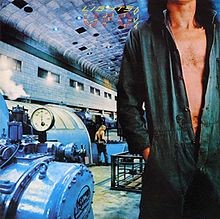 Unfortunately for Peyronel, his tenure in UFO did not last long and after the tour for ‘No Heavy Petting’, he vacated his position in the band and was replaced by the considerably more versatile ex-Savoy Brown Paul Raymond who would add his expertise to the UFO sound over the coming years. Between the addition of Raymond and a change in producer from the softer Leo Lyons to the harder Ron Nevison, 1977 would see UFO revamp their sound with ‘Lights Out’. Once more, heavy touring would affect the quality of ‘Lights Out’, but this would not stop ‘Too Hot to Handle’ and the heavy gallop of the title track from adding themselves to many UFO fans favourite song list. However, it was the beautiful string arrangements to the albums closing track ‘Love to Love’ which stole the limelight and it was the addition of Raymond which made this possible. UFO were no stranger to their softer side, but under the guidance and expert keyboard playing to match Schenker’s virtuoso guitar playing, ‘Love to Love’ would become one of the best UFO songs ever recorded; a testament to this song is that it has been played on every tour consistently since.
Unfortunately for Peyronel, his tenure in UFO did not last long and after the tour for ‘No Heavy Petting’, he vacated his position in the band and was replaced by the considerably more versatile ex-Savoy Brown Paul Raymond who would add his expertise to the UFO sound over the coming years. Between the addition of Raymond and a change in producer from the softer Leo Lyons to the harder Ron Nevison, 1977 would see UFO revamp their sound with ‘Lights Out’. Once more, heavy touring would affect the quality of ‘Lights Out’, but this would not stop ‘Too Hot to Handle’ and the heavy gallop of the title track from adding themselves to many UFO fans favourite song list. However, it was the beautiful string arrangements to the albums closing track ‘Love to Love’ which stole the limelight and it was the addition of Raymond which made this possible. UFO were no stranger to their softer side, but under the guidance and expert keyboard playing to match Schenker’s virtuoso guitar playing, ‘Love to Love’ would become one of the best UFO songs ever recorded; a testament to this song is that it has been played on every tour consistently since.
Following the success of ‘Lights Out’, UFO would immediately return to the following another extensive tour to record their 1978 release ‘Obsession’. For many people, ‘Obsession’ would be their ‘go-to’ studio album, containing the favourite ‘Only You Can Rock Me’. However, by the tour for ‘Obsession’, tensions within the band would reach boiling point causing Schenker to leave UFO midway throughout the forthcoming tour. Although, the studio albums from this period would contain classic songs interspersed with a large amount of filler, it was addition of the seminal 70’s ‘live’ album to UFO’s cannon which would solidify the bands reputation. ‘Strangers in the Night’ was released in 1979 and shows the UFO line-up of Mogg/Way/Schenker/Parker and Raymond in full flight. Often described as UFO’s definitive album, ‘Strangers in the Night’ contains every song from this era that a fan could want to listen to coupled alongside an excellent sound quality and blistering playing. Unfortunately for UFO, the band would never reach this pinnacle again, shifting line-ups, bad decisions and heavy drink and drug abuse would mar the next 20 years of UFO’s career.
Following the abrupt exit of Schenker in 1978, UFO moved to replace him with LoneStar’s Paul Chapman, who had briefly been a member of UFO during 1974-75. Nicknamed ‘Tonka’ due to the excessive amount of alcohol and drugs he could take before passing out, Chapman had all the skills of Schenker, but unfortunately for UFO, Chapman lacked the charisma and song-writing skills of the blond mad axeman. 1980 dawned with the rise of the New Wave of British Heavy Metal (NWOBHM) movement, new and dynamic bands like Iron Maiden, Saxon, Diamond Head and Venom rose to the forefront of heavy metal causing a significant change in the musical landscape. A large amount of from the early 70’s had begun to flounder, break-up or disappear into an alcohol/drug fuelled abyss, however, Black Sabbath, Judas Priest, Blue Öyster Cult and Motörhead, although never NWOBHM bands, happily rode on the crest of the wave created by NWOBHM to a newfound audience and amongst these were UFO.
The band needed to reinject some vigour in this new decade and hired the legendary producer of The Beatles, George Martin to produce their 1980 album ‘No Place to Run’. As a band, UFO could still draw a serious crowd for their shows; a headline performance at the 1980 Reading Festival is testament to this, but unfortunately for the band, ‘No Place to Run’ didn’t quite hit the stride of their previous albums causing keyboardist Paul Raymond to leave and be replaced by Neil Carter. Carter would prove to become essential to UFO over the coming years, his song-writing expertise worked well with Mogg with many people professing that 1981’s ‘The Wild, The Willing and The Innocent’ being their favourite post-Schenker UFO album.
The line-up of Mogg/Chapman/Way/Parker and Carter would prove to be extremely fruitful with their 1982 album ‘Mechanix’, an album that would give the band their highest ever UK charting at number 8. However, this wasn’t to last and iconic bassist Pete Way would leave UFO following the tour for ‘Mechanix’ after becoming disenchanted with the lighter and more radio friendly sound that UFO were exploring. ‘Making Contact’ was released in 1983 with Carter providing the bass for the album, but the loss of Way was a large blow to the band, the bassist had been a strong backbone for the band since 1968 and the album did not have the same chemistry without him. ‘Making Contact’ proved to be a commercial failure, it was disliked by both fans and critics alike and following a disastrous attempt at a tour wrought with inter-personal conflicts and excess, UFO announced their disbandment following a final UK farewell tour in late 1983.
Before too long and less than two years later, UFO were back with a new line-up featuring ex-The Damned and Eddie and the Hot Rods bassist Paul Gray, ex-Diamond Head drummer Robbie France and former UFO roadie Atomik Tommy M on guitar. This new line-up was joined by the long serving Paul Raymond on keyboards with the band releasing the lacklustre ‘Misdemeanor’ in 1986 and ‘Ain’t Misbehaviin’’ EP in 1988. Following the release of ‘Misdemeanor’, UFO once more became a revolving door of line-up changes and with poor record sales and a lack of interest from the media, UFO once more folded in 1989.
Fate would once more intervene and once more, less than two years later, UFO would reform again, this time, it would see the return of Pete Way alongside Mogg. The duo would recruit former Rococo and Wild Horses drummer Clive Edwards and former Stampede guitarist Laurence Archer releasing ‘High Stakes & Dangerous Men’ in 1992. Although released through the independent Razor Records, ‘High Stakes…’ sold well and from there, Mogg and Way set the ball rolling for a reunion of the classic line-up of UFO. The following year, Schenker, Parker and Raymond once more joined with Mogg and Way for ‘Walk On Water’, an album that also saw a reunion with producer Ron Nevison and would be independently released through Zero Corporation records. ‘Walk On Water’ was well received by fans, but it failed to chart and with old tempers running high, Schenker once more walked out of UFO, also followed by the departure of Parker 1998. By this point in the band’s career, it was unclear as to whether UFO would actually continue, Raymond was working on his solo project and Mogg/Way had been working together on their own project. Schenker’s return to UFO in 2000 would provide some stability albeit temporarily to the band to which ‘Covenant’ was recorded later that year followed by ‘Sharks’ in 2002. However, following the release of ‘Sharks’, Schenker would leave UFO for the final time to be replaced by former Vicious Rumors virtuoso guitarist Vinnie Moore in 2003.
The introduction of Moore into the group injected UFO with some much-needed fresh blood and together with Jason Bonham behind the drumkit the band signed a deal with SPV/Steamhammer Records and released ‘You Are Here’ in 2004 to a warm reception. However, this line-up would not last long and Bonham would leave UFO to join Foreigner. The empty drum stool would pave the way for the long-awaited return of Andy Parker and for UFO, the pieces would fall into the place for the first time since ‘The Wild…’. As a line-up; Mogg/Way/Moore/Parker and Raymond would prove to be fruitful with ‘The Monkey Puzzle’ being released in 2006 to once again a glowing warm reception.
In a strange Lemmy twist of fate, founding bass player Pete Way would be unable to attain a visa to tour the USA in 2008 due to previous drug convictions and due to medical issues, it would see the iconic bass player remain a member of UFO, but in name only and has been replaced by Rob De Luca who cut his teeth playing for Sebastian Bach. Over the course of their career, UFO have had many ups and downs, but their career would come full circle, their 2009 album ‘The Visitor’ would give the band their highest chart position since 1994. Unfortunately, ‘The Visitor’ was missing Pete Way, but this did not stop the warm reception and critical acclaim, a trait that continued into 2012 with their last studio album ‘Seven Deadly’, an album that would see the band score a higher position than that of ‘The Visitor’ and for the band to claw their way back on top after more than 25 years in wilderness.
With UFO’s 50th anniversary fast approaching, Phil Mogg announced that he would be stepping down as the vocalist of UFO. The man who has been there from start will hang his microphone up for the last time next year and draw the curtain on a band which deserves to take their place as one of rock and metal’s most influential and important bands. Long may their legacy live on from simple space rock to pioneering heavy metal and becoming elder statesmen of a genre with over 30 subgenres. One thing is for certain, it has been one hell of a ride, thank you UFO.
MHF Magazine/Adam McCann


